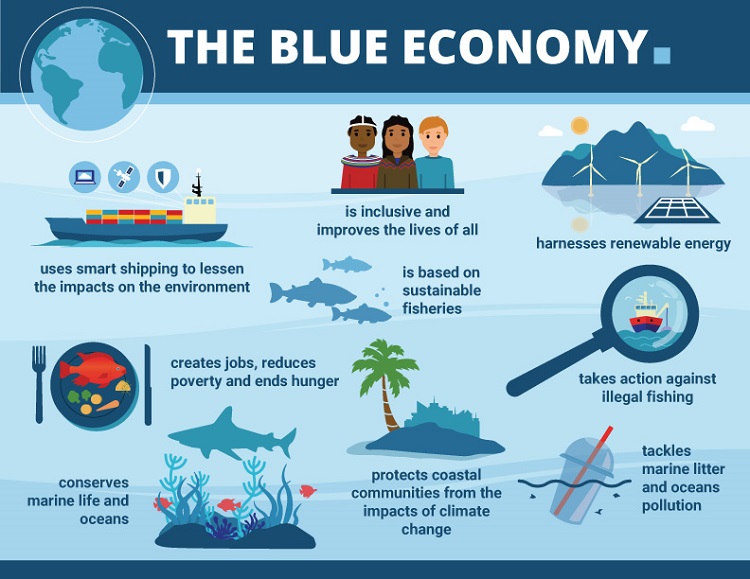 Vincent Toritseju
Vincent Toritseju
Lagos — In a move to tackle foreign domination of shipping business in Africa, the African Union, AU, has decided to adopt the Deep Blue Economy strategy by taking initiatives to promote maritime transport, port activities, maritime security, as well as interstate exchanges.
In a report “Africa Blue Economy Strategy”, the AU noted that foreigners intentionally destroyed the budding African shipping lines and conferences to ensure that only Europeans offer such services and at their own prices.
Besides, the AU is also expecting Port activity in Africa to reach two billion tons by 2040.
West Africa is home to port facilities in the process of continuous modernization since the end of the colonial era.
East Africa has expanded its ports, including Djibouti, which is responsible for exports to Saudi Arabia, Egypt and India. The port of Dar-Es-Salaam in Tanzania carries many imports from India and China.
To this end the group also concluded plans to reduce, if not eliminate foreign domination of shipping businesses in the Continent as it commenced research and studies in Fisheries, aquaculture, conservation and sustainable aquatic ecosystems, Shipping/transportation, trade, ports, maritime security, safety and enforcement, Coastal and maritime tourism, climate change, resilience, environment, infrastructure, Sustainable energy and mineral resources and innovative industries, polices, institutional and governance, employment, job creation and poverty eradication, innovative financing.
According to the report, the AU noted that in its current configuration, maritime trade remains dominated by arms conglomerates which unilaterally set freight rates and thus organize the shipping market as they see fit.
Parts of the report reads: “This situation was favored by a series of measures aimed at deregulation of the sector, with the main consequence being the disappearance of the liner conferences and the abandonment of the code of conduct for liner conferences, which established, inter alia, a key for allocating freight and an obligation to consultation between the different stakeholders, shipping companies and shippers.
“In a context of hyper competition, marked by competitive interactions generating situations of permanent imbalance, the maritime transport sector, like all sectors of the economy, is facing a rapid evolution of business conditions.
“Since the liberalization of shipping in 1995, most shipping companies, particularly those in West and Central Africa have disappeared. Shippers therefore have serious difficulties in transporting their cargoes at reasonable costs, with foreign shipping companies operating at very high freight rates.
“Moreover, in most African countries, port infrastructures are obsolete and transport corridors in poor condition.
“However, there have been positive developments in recent years, in 2017, the global economy and maritime trade rebounded from the historical lows of 2016, nearly a decade after the 2008-2009 economic and financial crisis.
“The main indicators of the economy and shipping have increased, reflecting growth in global investment, manufacturing and trade in goods.
“With GDP growth of 3.1% in 2017, up from 2.5% in 2016, the global economy has recovered significantly, with positive impacts on maritime traffic in Africa.
“It is in this context that the African Union has decided to take initiatives to promote maritime transport, port activities, security, maritime security, as well as interstate exchanges.”
Some of the outlook the Union has also planned to do includes the development of maritime transport in Africa, noting it is necessary to implement the various instruments adopted by the international community, the African Union and the various regional and sub-regional organizations, in particularly the Code of Conduct for Maritime Conferences adopted by UNCTAD in April 1974, whose objectives are to ensure to national companies traffic participation rights allowing them to carry a significant part of foreign trade their country, to ensure a balance between the interests of shippers and ship-owners and to facilitate the steady development of liner traffic.
The Agenda 2063, strategic framework for the socio-economic transformation of the continent over the 50 years refers to the ports operations and marine transport is also one of the outlook the Union is considering and the main objectives in the field of transport are: maritime transport and auxiliary services, port management, safety of maritime navigation, promotion of the African flag, promotion and protection of the interests of shippers , access to the sea and freedom of transit for landlocked states, development of waterways, development of maritime infrastructures, promotion of an African fleet, promotion of an African maritime code harmonized.
‘‘Others are The Lomé Charter 2016, aims essentially to promote and strengthen cooperation in the fields of maritime awareness, prevention through early warning and the fight against piracy, armed robbery against ships and illicit trafficking of any kind, and The African Maritime Charter Revised declare, articulate and implement harmonized maritime transport policies capable promoting sustained growth and development African merchant fleet and to foster closer cooperation amongst States parties of the same region and between regions.’’
Although Africa still has a relatively small impact in international trade (3% of world volumes), African shipping follows the upward trend in the world. As a result, traffic in African container ports has grown at an average annual rate of 8% over the past five (5) years, compared to a global 5% change. According to a study of African ports (Ocean Shipping Consultants, 2008),
container traffic doubled in the period 1995-2005.
Similarly, the forecasts of the International Monetary Fund and the World Bank show an increase in the continent’s traffic to 38 million TEUs in 2020 against 15 million in 2011.



